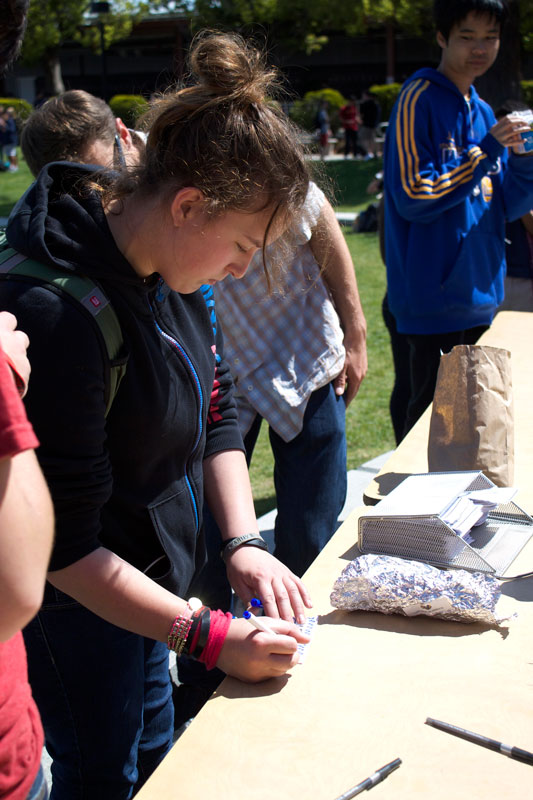
NIOS member junior Maryetta Graves writes a stereotype on a piece of paper to disolve in a pool of water as part of a Not in Our School activity.
On March 24, the Spread the Awesome Club launched an anti-bullying campaign called Not In Our Schools Week. During the week, students were given the opportunity to participate in various anti-bullying activities, which included signing an anti-bullying pledge and watching screenings of the movie “Bully,” a documentary that depicts the painful consequences of peer harassment.
Not In Our School is a subset of the organization Not In Our Town, which was started to combat bullying and hate speech in the town of Billings, Montana after several incidents of bullying-induced suicides.
At the beginning of the week, social studies and health teachers told their students to circle places on a map of Aragon where they had observed bullying or hate speech. According to Spread the Awesome Club advisor Kirt Peterson, an estimated 95 percent of students turned in a map.
Peterson says, “We believe the data will show some very specific places where teachers often aren’t, and we will probably try to have them, have teachers there during passing periods and things like that.”
During lunch, the Spread the Awesome Club encouraged students to sign a pledge against bullying and hate speech.
Sophomore and Spread the Awesome Club president Mellisa Leong says, “We noticed that bullying is a worldwide issue that needs to be solved, but it can’t be solved until someone starts … If they want to [sign it] that’s great; if they don’t want to, that’s also great. It’s their decision.”
About 40 percent of the student body signed the pledge.
The club handed out wristbands with the statement “A-Town is Our Town.” Peterson says, “The message wasn’t something like ‘end hate’ or something phrased with negative terms—we wanted to make it about connecting Aragon. And it is not just like ‘A-Town rocks!’ That doesn’t really hint at or really explicitly talk about connectivity. Saying it is ‘our town,’ ‘our’ is an inclusive term, and it describes that we are all in this together.”
Students also wrote hurtful stereotypes on rice paper and watched them dissolve in water as a metaphor for “dissolving” such stereotypes. Peterson says, “It is just a culminating activity that we would like to do to try to say ‘We are moving beyond these stereotypes, we are moving beyond negativity, we are going to embrace a more positive place.’”
The Spread the Awesome Club also hopes that by making students more aware of bullying and negativity, they can more effectively combat it. Junior Christian Joachin says, “I think it will [be effective] because people are acknowledging the fact that bullying is happening on campus, and bullying can be unintentional, but people’s feelings are getting hurt.”

Cleo Wienbar